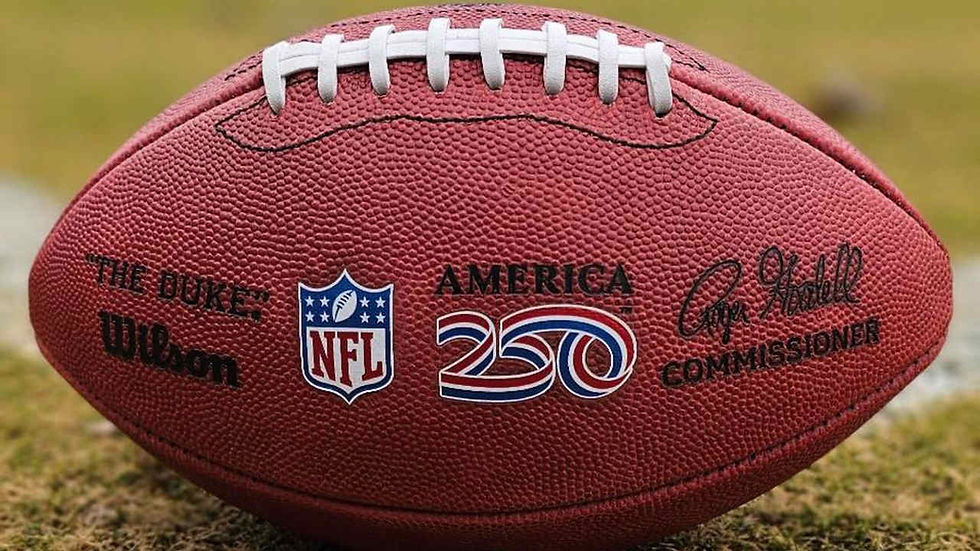NFL Academy: International Football Athlete Pathway to NCAA
- Timothy F. Bryson

- Oct 31, 2023
- 4 min read
Updated: Dec 9, 2025
The NFL London Games but American football remains in the United Kingdom. Founded in 2019, the NFL Academy is “a global initiative by the NFL, which aims to use American football to create life-changing opportunities for young people all around the world.” The Academy is football specific school that includes American football training alongside full-time education and athlete development programming. It mirrors the NBA Academy model that the NBA has funded and facilitated for years in places such as Africa, Latin America, and India.
Don’t worry, we’ll be discussing the NBA Academies in a future blog.
The Academy is based at Loughborough University (United Kingdom). Loughborough is the premier site for sport in the UK as a number of UK sport governing bodies and academic centers are headquartered on their campus, including Olympic and Paralympic Research. Athletes live on campus in Loughborough residence halls - very similar to the NCAA college athlete experience.
During the 2023-2024 academic year, the NFL Academy will host 62 football student-athletes from 13 unique countries around the world. Student-athletes learn the rules of American football (literally) and simultaneously train with NFL experienced coaches who are tasked with helping athletes develop into highly touted recruits. When not engaged in football specific programming, student-athletes are handling business in the classroom to ensure they are eligible and prepared to study in the U.S. higher education system. Think IMG Academy.
The purpose of the program?
Secure football scholarships to compete and study at NCAA member institutions. Since 2019, more than 40 Academy alumni have secured scholarships – 20 of whom are currently competing on NCAA football programs this year.
Daniel Akinkunmi, is the latest NFL Academy athletes to officially commit to a Power 5 institution, the University of Oklahoma. Daniel is ranked as the number one European prospect and also earned Under Amour All-American honors.
But this is more than a feel good story. This is the present and the future.
It’s no secret – the NFL wants to grow American football globally.
They host regular season competitions in non-U.S. countries, such as the United Kingdom, Germany, and Mexico. Commissioner Goodell has mentioned Spain and Brazil as new future host countries for competition in 2024. The NFL has also invested in securing international marketing rights so NFL clubs can utilize content to engage with fans on a localized level. Clubs, such as the Pittsburgh Steelers, have hired international content managers to lead their global expansion strategy.
But the most efficient and effective way to dramatically boost global engagement in American football? Make it personal – increase the number of international players in The League.
Step 2: Create a pipeline for international talent to learn American football, compete as NCAA athletes, and be drafted into The League
The NFL Academy is the start of the pipeline and they are doing a damn good job.
Over the last month, the NFL Academy team competed against U.S. high school powerhouses IMG Academy and Erasmus Hall in London. The NFL Academy delivered IMG Academy’s first loss (31-14) and shutout Erasmus Hall in a 35-0 victory. FYI: Erasmus has won the Public Schools Athletic League (PSAL) NYC State championship four times in a row.
The NFL Academy is working. They are competing at a high level and many Academy athletes are receiving NCAA Division I offers. The NFL is the dream, but Academy alumni must first enter the NCAA system as college athletes. Currently structured – NCAA football and college athlete development programs are not prepared.
The international college athlete (ICA) development experience is unique and should not be compared to their U.S. American athlete peers. We are becoming more familiar with the research and insight about ICA transition and adjustment – but this knowledge is blanketed and does not acknowledge the diversity within the ICA population. Additionally, much of the research and conversation about ICAs has focused on ICAs who compete in Olympic sports – American football athlete experience is very different.
Timi Oke, current NFL Academy athlete, recently took a visit to Northwestern University.
The NFL Academy will continue to produce ICAs who matriculate into U.S. higher education. Our role as educators, administrators, and coaches is to learn how we can best support ICA football player retention, belonging, and career readiness. Below is where we can start.
Familiarize yourself with the number of ICAs at your respective institution. How many different countries and languages do these students represent?
Schedule dedicated time with ICA football players to learn more about their story, goals while in the U.S., and what their expressed needs are while they are here.
The F-1 student visa. Create ICA specific programming related to understanding the opportunities and limitations related to their student visa.
Learn more about the purpose of sport in ICA’s respective countries. Is sport being leveraged for economic development or entrepreneurship?
How can you use this information to facilitate ICA specific programming?
NIL activity is prevalent in NCAA FB. Given the current restrictions regarding NIL monetization for ICAs, how can you help ICAs pursue NIL activity outside of the United States and/or think about facilitating entrepreneurship education to help them create businesses in a non-U.S. country?
Check your personal privilege and bias. How can you leverage your privilege to support the holistic development of ICAs in U.S. higher education?
In an era where the transfer portal and Name, Image, and Likeness (NIL) are dominating college sport headlines – international college athlete development is being overlooked and ICAs are being forgotten. NCAA institutions and supporting stakeholders have work to do. Important work, and work that needs to quickly happen.
Walk With TFB is committed to helping all NCAA member institutions create strategies, programming, and policies to best support ICA recruitment, retention, and career readiness.
The future of NCAA football is global.
It’s happening. We’re walking.




Comments